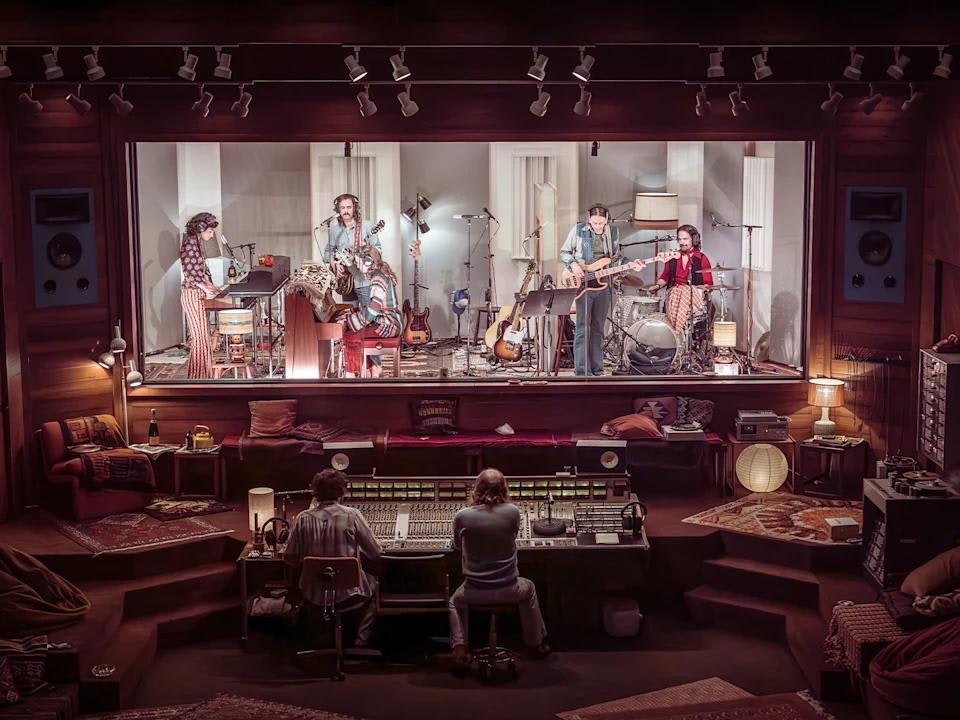This article is taken from the August-September 2025 issue of The Critic. To get the full magazine why not subscribe? Right now we’re offering five issues for just £25.
For rock fans of a certain vintage, Fleetwood Mac’s 1977 album Rumours remains not only beloved but seminal. It contains many of the band’s best known and most popular songs, not least “Go Your Own Way” and “Dreams”, but the vibrancy of the music was belied by a tortuous recording process that saw the two key interpersonal relationships in the band — those of keyboardist Christine McVie and bassist John McVie, and guitarist Lindsey Buckingham and singer Stevie Nicks — break down in acrimony.
The Anglo-American composition of the band was unorthodox and led to culture clashes between two very different approaches to music, and the group’s eventual dissolution. Such artistic clashes make for fertile dramatic territory, and David Adjmi’s much-heralded new play Stereophonic deserves credit for its exploration of such a fascinating dynamic. There is, however, one key difference.
The fictitious, unnamed band here is not Fleetwood Mac — despite including two couples whose relationships are tested beyond measure through the difficult process of recording a brilliant album — and the music, heard fleetingly but effectively, is by Will Butler, a former member of the band Arcade Fire.
Although there has been an out-of-court settlement revolving around Adjmi’s apparent appropriation of the events depicted in a memoir about the making of Rumours, the party line is that this isn’t the Fleetwood Mac or Rumours story, in any way, shape or form. Got that? Good.
If the play were less accomplished, then it would be easier to watch it with wry scepticism. After all, there have been endless examples of artists homaging real-life events or lives and then swearing blind that they have not done so.
Yet if audiences turned up simply expecting a dramatic roman-à-clef, they would probably be disappointed for the first 20 minutes or so, and then gripped by the increasingly intriguing events, which revolve around the tortuous creation of a Great (Anglo-) American Rock Album over the period of a year.
Cocaine and booze are in constant supply, and we watch the events unfold from behind the mixing desk, as engineers Charlie and Grover (the excellent Andrew R. Butler and Eli Gelb, both holdovers from the Tony-winning Broadway show) alternately mix, banter and act as Greek chorus as the temperamental musicians bicker, fight and create music of genius.

It is usually impossible to present the art of creativity in an engaging and convincing fashion on stage. Here, it succeeds. Daniel Aukin’s production takes the bold step of having a cast who not only look like musicians from the Seventies (thanks to Enver Chakartash’s brilliant, ever-changing costumes and Robert Pickens and Katie Gell’s authentic-looking hair and make-up) but who can also sing and play their instruments to a standard that makes them sound just like the real thing.
At its best, Stereophonic, brilliantly designed by David Zinn, feels like having a front row seat at something remarkable. And the play’s success lies in the emotional weight that it slowly, subtly accrues over its three and a quarter hours’ length.
For much of the first act, interest comes in the minor details, with the interplay between the egotistical, brilliant frontman Peter (Jack Riddiford), his talented but underappreciated girlfriend Diana (Lucy Karczewksi) and the married couple in the band, the substance-abusing Reg (Zachary Hart) and the gentler Holly (Nia Towle).
The suave drummer (not words I ever expected to use) Simon (Chris Stack) acts as confidant and peacemaker, but Peter’s increasingly demanding, aggressive actions cause both interpersonal and creative tension amongst the musicians.
Adjmi asks whether it is worth being a complete bastard in order to get magnificent results, or whether the sacrifice of personal integrity is too high a price to pay.
For much of the (admittedly overlong) first half, these questions are implicit, but they come into focus in the deeply affecting third and fourth acts, when the music becomes subsidiary to the human drama.
Holly, beautifully played by Towle, has a long discussion about the emotional force of Nicolas Roeg’s Don’t Look Now. Rather than this being some piece of Tarantino-esque pop culture trivia, it becomes heartbreakingly clear that she is longing for the warmth of the relationship that Donald Sutherland and Julie Christie, the protagonists in that picture, enjoy, and failing to find it in her marriage.
A charged, stand-up confrontation between Peter and Simon resolves itself in an unexpected and psychologically rich way. And the engineers, especially the amicable Grover, find themselves drawn into the maelstrom to personally devastating effect.
I don’t know if Stereophonic will repeat its epoch-defining, awards-guzzling success on Broadway in the more cynical London market. It could do with being a good 45 minutes shorter and offering a sharper definition of its protagonists earlier on; for much of the first act, they are all but indistinguishable from one another.
Yet as the evening wears on, and the music seduces the audience just as it leads to discord amongst its makers, it is hard not to feel that you have watched something rather special. Rumours, be damned. This particular act stands up triumphantly on its own terms, rather than as a mere after-the-fact tribute band.












